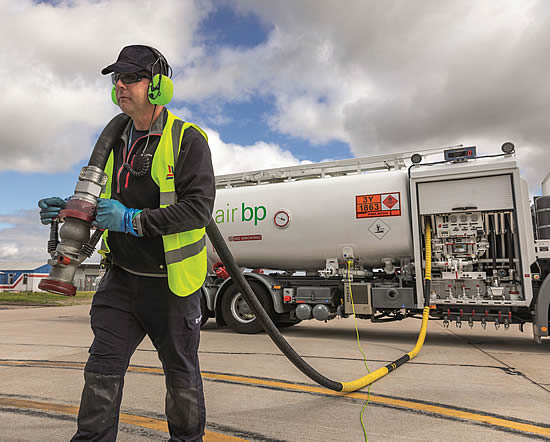In the aviation world, product quality is a big deal - especially when it comes to fuel. At Air bp, we take fuel product quality seriously, but that doesn’t just mean ticking regulatory boxes. It’s about keeping passengers safe and aircraft flying smoothly.
Why quality matters (spoiler alert: It all comes down to safety)
Aviation fuel is the lifeblood of an aircraft engine. Jet fuel has very stringent standards because it needs to operate both on the ground and in the sky at extreme low pressure and temperature.
That’s why Air bp goes all out to make sure our fuel meets the industry standards. High-quality aviation fuel is one factor that can help reduce the likelihood of equipment failure and helps with optimal engine performance. But the bottom line is that it bolsters overall flight safety.
Identifying product quality risks
What is a product quality incident? It’s any unplanned event or occurrence that could affect the quality of our fuel and, by extension, the safety of our customers and their passengers. Air bp has identified three key areas of risk directly related to product quality:
-
A1 Risk: Although rare, this is the big one. Think catastrophic events like an aircraft crash because of engine failure due to fuel issues such as excessive particulates or water in hydrant fuel. A scary prospect, but we’ve got rigorous systems in place to mitigate this risk.
-
Contaminated Fuel: While less extreme than an A1 risk, nobody wants a tank full of off specification fuel. This poses a threat to aviation safety and is therefore to be avoided.
-
Fuel System Icing Inhibitor (FSII) is used to prevent ice formation caused by water precipitation from fuels upon cooling during flight: Supplying fuel without this additive t is another critical risk, that must still be carefully managed. This is done by ensuring the fuel has the right additive at the correct concentration for safe operation of the aircraft.

Sustainability meets safety
It is widely acknowledged that sustainable aviation fuel (SAF) is integral to achieving the industry’s net-zero lifecycle emissions target by 2050. However, scaling SAF supplies safely and efficiently, while maintaining product quality brings its own set of challenges. Air bp is working hard to make SAF more widely available while keeping quality top-notch. Whether it’s evaluating and testing different production methods and feedstocks or collaborating with task forces like ASTM* and the Joint Inspection Group (JIG)** to build technological expertise and obtain approvals, we are in it for the long-haul.
Fun fact: In 2023, we were delighted to be one of the preferred suppliers of SAF for Virgin Atlantic’s Flight100 - the first Transatlantic test flight by a commercial airline which only used SAF (instead of the 50:50 mix of SAF and fossil jet fuel which the industry normally has to use).
Staying ahead of the game
Managing fuel quality across a global network from refineries to airports and, ultimately, to aircraft isn’t easy.
However, Air bp has got this down to a science (literally). Here’s how we do it:
-
Quality manual: We adhere to strict aviation industry standards that outline procedures for the production, storage, distribution and delivery of aviation fuel.
-
Expert teams: Our competent and highly skilled operators and support staff regularly undergo rigorous and frequent training.
-
Safety-first facilities: From fuel segregation and filtration systems to tank designs that facilitate the removal of dirt and water, our fuelling products and equipment are designed by the industry for the industry with safety in mind.
-
Critical control checks: At airports, we regularly perform thorough inspections to mitigate accident risks.
Audits and assessments: We frequently assess risks and review processes across the supply chain from new sources to laboratories so that we can address any potential quality issues in an efficient and timely manner.
Customer and industry collaboration
Ensuring product quality isn’t a lone operation, it’s about close cooperation across the sector. By participating in industry groups like ASTM, the MoD Aviation Fuels Committee, the Energy Institute (EI) and JIG, Air bp helps set the standards that keep aviation running smoothly. These collaborations also mean we’re always engaged with the latest best practices and technologies.
And of course, our customers are at the forefront of our operations and aspirations. If you’re ever unsure about fuel quality or just want to discuss specifications or concerns, our Quality Assurance team is always on hand.
Safer skies
At the end of the day, maintaining fuel quality isn’t just about keeping aircraft flying high; it’s about protecting lives and upholding the trust of everyone involved from aviators to operators. With stringent risk management processes and innovation, Air bp continues to set and maintain the standard for aviation fuel product quality. So, when you next take to the skies, you can rest assured fuelled by the knowledge that we take our responsibility to provide safe, quality fuelling products and services seriously.
[*] ASTM Task Force: A voluntary group of interested parties who agree to work together on the development and approval of an ASTM committee proposal. Task Forces are formed and operate at the discretion of the committees; new Task Forces are formed by committee motions and consensus voting. New Pathway Task Forces are typically led by the entity who has developed the synthetic conversion technology, and/or an entity who wants to commercialise such technology.
[**] The Joint Inspection Group (JIG) was formed in the 1970's by the major oil companies to provide a means of establishing operating standards, fuel quality standards and an inspection programme for joint venture aviation fuelling operations.




